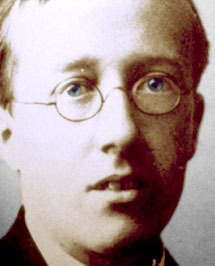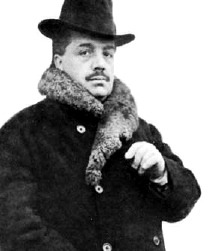 “Minors of the Majors” invites you to discover compositions by the great classical composers that for one reason or another have not reached the musical mainstream. Please enjoy, and keep listening!
“Minors of the Majors” invites you to discover compositions by the great classical composers that for one reason or another have not reached the musical mainstream. Please enjoy, and keep listening!
Primarily known for his vastly influential orchestral compositions—most notably The Planets—Gustav Holst (1874-1934) nevertheless composed a wide variety of moving choral works. At the tender age of 12, he won a prize in an amateur competition with his vocal work A Christmas Carol. His most popular choral composition, Hymn of Jesus, dates from 1914 and helped to establish his international reputation. One of the few early works of Holst to survive his scrupulous self-criticism is an unassuming setting of the Ave Maria for eight-part female chorus. Completed in 1900, shortly after he abruptly left the Royal College of Music, the composition is dedicated to the memory of his mother, Clara Lediard Holst, who died when he was a child. Largely self-taught as a composer, this early devotional setting noticeably reflects Holst’s multifaceted personality by simultaneously combining clarity of expression with romantic exuberance. Scored for eight independent parts, the music skillfully combines modal and tonal harmonies to produce a setting that sounds both ancient and modern. Smoothly flowing counterpoint creates harmonies of varying intensity and colour, as the chorus is frequently divided into smaller units. In effect, this subdivision creates two independent choruses that musically respond to the demands of the text. This prophetic little jewel clearly points to his later musical accomplishments, as it is breaking away from the heavy chromaticism of Wagner. Simultaneously, it rejects the austerity of Victorian church music by using dissonances within a diatonic harmony with much greater freedom. Sadly, Holst was unable to support himself by his compositions, and so he played the trombone professionally and later became a respected teacher. Nevertheless, the composer Edmund Rubbra suggested, “Holst’s influence is lasting in the work of all of us who value directness and sincerity and who view music not so much a secret preserve for the leisured few but as a vital part of everyday life.”
Gustav Holst: Ave Maria
You May Also Like
- Minors of the Majors
Anton Bruckner: Abendzauber (Evening magic) Unlike his compatriot Gustav Mahler, Anton Bruckner wrote a considerable quantity of choral music. - Minors of the Majors
Darius Milhaud: Sonatina for clarinet and piano, Op. 100 In his mid-20’s, Darius Milhaud was already an international musical superstar! - Minors of the Majors
Gabriel Fauré: Cantique de Jean Racine, Op. 11 Gabriel Fauré (1845-1924) was a revered teacher and a proactive administrator on behalf of music. - Minors of the Majors
Michael Haydn: Symphony No. 11 in B-flat major, Perger 9 In the 1920’s, Hans Gál was the rising star of the Austro-German music scene.
More Anecdotes
- Love for the City: Elgar’s Cockaigne Discover the story behind Cockaigne, subtitled ‘In London Town’
- Food for Thought
Mealtime With Giacomo Puccini Puccini was a great lover of life, of music, women, fast cars and of food -
 Movers and Shakers: Sergey Diaghilev (1872-1929) Learn about his life and career and the famous "Ballets Russes"
Movers and Shakers: Sergey Diaghilev (1872-1929) Learn about his life and career and the famous "Ballets Russes" - A Whale Strangled by a Giant Squid
Ralph Vaughan Williams’s Tuba Concerto "I had finally made a tuba concerto sufficiently plausible musically to be acceptable."

